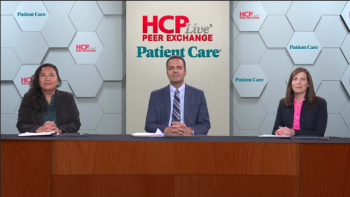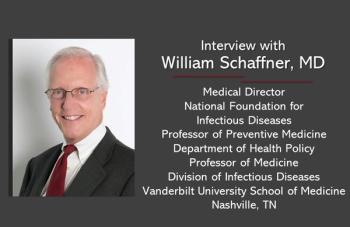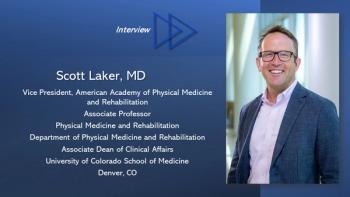
Eden Miller, DO, shares key takeaways on how personalized treatment helps in the management of diabetes.

Eden Miller, DO, shares key takeaways on how personalized treatment helps in the management of diabetes.

Elizabeth Holt, MD, FACE, and Eden Miller, DO, comment on the pros and cons of real-world data studies, looking particularly at the study of the OneTouch Verio Flex meter and the OneTouch Reveal apps.

Experts discuss steps to introduce the OneTouch Verio Flex meter and the OneTouch Reveal app to patients to better manage diabetes.

A panel of experts comment on primary care vs specialist care for patients with asthma, and when patients should be referred to a specialist.

Reviewing the symptoms of coughing, wheezing, and shortness of breath as a product of an overactive immune system and as a sign of asthma.

Eden Miller, DO, reviews the impact the BGM and diabetes management apps have on the patient, giving clinicians a better ability to personalize treatment and empower the patient.

Experts discuss how the amount of time a patient spends engaging with the BGM and diabetes apps will contribute to managing their diabetes.

Nicole Chase, MD, FAAP, FACAAI, FAAAAI, describes the mechanism of type 2 inflammation and comments on it being a prominent issue among patients with asthma.

Andrew White, MD, provides an overview of the difference of asthma endotypes and phenotypes as a way to define and diagnose asthma.

Primary care clinicians will often be the first challenged to recognize neurologic sequelae of COVID-19; here's how to maximize short visits to assess long COVID.

Medical director of the NFID William Schaffner, MD, shares 3 things about the RSV vaccine that should be top of mind for primary care clinicians.

Eden Miller, DO, highlights patient engagement with OneTouch Verio Flex meter and the OneTouch Reveal apps and how the data help to manage diabetes.

Elizabeth Holt, MD, FACE and Eden Miller, DO, review glycemic data over a 90-day and 180-day period in patients with diabetes.

Coauthor of a new multidisciplinary guidance statement on assessment of neurologic sequelae of long COVID highlights a consensus on steps to rule the condition out.

A Feinberg School of Medicine physiatrist with long experience assessing long COVID talks specifically about common neurologic sequelae of the infection.

Symptoms of long COVID were apparent by the summer of 2020, said physiatrist Dr Leslie Rydberg, coauthor of new consensus guidelines on management of neurologic sequelae.

Delivering 3 vaccines to older adults is going to be a challenge this fall, says Dr William Schaffner.

Experts provide an overview of a study on the use of the OneTouch Verio Flex meter paired with the OneTouch Reveal mobile application in the management of diabetes.

Elizabeth Holt, MD, FACE and Eden Miller, DO, comment on saving time for the provider and giving patients ownership of their data as benefits of using digital BGM apps in the management of diabetes.

Immunize.org's Dr Kelly Moore says that without clear surveillance data on RSV, particularly on hospitalizations, clinicians may hesitate to commit office resources to administration.

Low awareness of RSV in adults and misperceptions about the goal of vaccination aren't new challenges, says Kelly Moore, MD, MPH, Immunize.org president and CEO.

Medical director of the NFID William Schaffner, MD, discusses the research behind the FDA's decision to approve the first-ever RSV vaccine.

A nationally recognized obesity expert discusses mental health in women with obesity.

Immunize.org president and CEO Kelly Moore, MD, MHP, describes the holistic view the ACIP will take of the virus, the vaccine, and the overall economics of the immunization.

Kelly Moore, MD, MPH, says the public health community is relieved by the FDA's approval and excited at "the chance to finally do something about the disease."

Eden Miller, DO, highlights a lack of knowledge in both the patient and the prescriber as a barrier to effective use of BGM technology in diabetes, as well as the need for personalized care for patients.

Elizabeth Holt, MD, FACE, provides an overview of a study on patients with diabetes using the OneTouch Verio Flex meter, a blood glucose meter (BGM) and OneTouch Reveal, a diabetes-management digital app, in tandem.

Scott Laker, MD, vice president of the AAPM&R, offers 3 thoughts on what primary care clinicians should think of when they think about PM&R.

Dr Caroline Apovian reminds primary care clinicians who care for patients with obesity that diet and lifestyle counseling are essential for maximum results.

The partnership between primary care and PM&R is a tool in each specialty's tool box, with the patient's return to full function the shared goal.